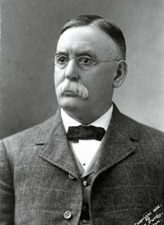In Patterson v. Colorado, 205 U.S. 454 (1907), the Supreme Court upheld a contempt citation against a newspaper publisher who had printed articles and a cartoon criticizing a decision by the Colorado Supreme Court in a pending case. The decision is more important as a historical relic than as a living precedent because its reasoning has been superseded by more expansive interpretations of the First Amendment and by the application of these provisions to the states.
Patterson held in contempt for printing articles criticizing Colorado Supreme Court
Thomas M. Patterson, a former United States senator and the principal owner of the Denver Times and the Rocky Mountain News, did not deny publishing the materials, which had targeted a series of questionable decisions in which the state supreme court appeared to have upended election results, but he did deny that they were contemptuous or that they were written at a time when the cases were pending. He argued that he should be able to present truth as a defense. He also argued that the contempt ruling by the Colorado Supreme Court was contrary to precedents and was self-serving.
Court upheld contempt citation
Writing for the 7-2 majority, Justice Oliver Wendell Holmes Jr. argued that the issues of contempt, and of prior precedents, were issues of “local law” that the Colorado Court could settle “without interference from the Constitution of the United States.” Holmes followed English common law interpretations in arguing that even if freedom of the press applied to the states, its primary purpose was that of preventing prior restraint of publication. Moreover, this rule applied even more strongly to contempts than to criminal libel. Although judges had sat in their own case, Holmes noted, not altogether convincingly, that “the grounds upon which contempts are punished are impersonal.”
Harlan thought Fourteenth Amendment applied free speech to states
Justice John Marshall Harlan I thought that Holmes’s view of the First Amendment was too crabbed. He believed that the due process clause of the Fourteenth Amendment applied the rights of free speech and free press to the states. Justice David J. Brewer’s separate dissent focused on jurisdictional issues.
Court later applied First Amendment rights to states
In Gitlow v. New York (1925), the Supreme Court subsequently adopted Harlan’s view that the due process clause applied freedom of speech to the states. In Near v. Minnesota (1931), the Court not only applied the freedom of press to the states but also decided that although the central purpose of that provision was to prohibit prior restraint, the freedom was not limited to that purpose alone.
John Vile is a professor of political science and dean of the Honors College at Middle Tennessee State University. He is co-editor of the Encyclopedia of the First Amendment. This article was originally published in 2009.

